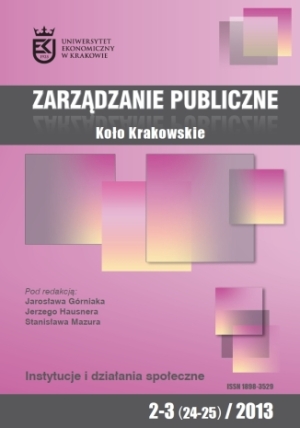Tragedia wspolnych zasobow w procesie politycznym
Tragedy of the commons in the political process
Author(s): Michał MożdżeńSubject(s): Economy
Published by: Uniwersytet Ekonomiczny w Krakowie we współpracy z Wydawnictwem Naukowym Scholar
Keywords: tragedy of the commons, political institutions, political process, budget, budgetary process, commons ma - nagement.
Summary/Abstract: Th e present article puts forward an analysis of the existence of the “commons” phenomenon in the political process, taking into consideration the question of revenue redistribution through fi scal decisions. Th e ways of fulfi lling state functions are defi ned narrowly as a “common resource” whose utilization allows one to realize individual gains while dissipating costs across the community. Th e author looks for the reasons of such a state of aff airs in the specifi cs of political decision-making, which is by its very nature burdened with high transaction costs and therefore requires the rejection of the unanimity rule, as postulated by Buchanan and Tullock (1962). Th e assumption behind the analysis is normative in nature and points towards the fact that the consequences of such a state of aff airs are socially negative, because it creates incentives to spend public means imprudently, or, to put it more generally, to make political decisions without ascribing full social costs to them. In connection with that, the author tries to identify institutional solutions that should, without generating too high transaction costs, allow for minimizing external costs of political decisions. Th e institutions are selected based on two typological approaches: a categorization of formal political institutions proposed by Von Hagen (2006), and Ostrom’s approach (2000) suggesting a set of rules structuring decision-making in the process of common-resources management.
Journal: Zarządzanie Publiczne
- Issue Year: 2013
- Issue No: 24+25
- Page Range: 102-115
- Page Count: 14
- Language: Polish

